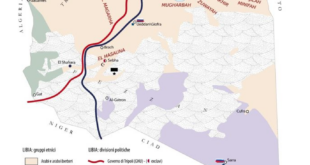Libya’s long journey towards international acceptance began four years ago. It was in 2004 that diplomatic relations between Washington and Tripoli were re-established. Dialogue was re-opened and economic sanctions were brought to an end.
When he came to power in 1969, Muammar Gaddafi quickly got the Americans’ backs up by demanding, among other things, that they evacuate their bases on Libyan soil.
One diplomatic challenge followed another, but it was the issue of oil that really raised the spectre of conflict. Gaddafi nationalised his country’s oil industry and even managed to raise the price of a barrel of crude, paving the way for other producers to do the same.
During the 1980s, Libya was implicated in several terrorist atrocities like the 1986 bomb attack in a West Berlin disco, a favourite haunt of expat US military personnel at the time. Three died and hundreds were injured.
US retaliation was swift and deadly. Bombing raids on Tripoli and Benghazi claimed dozens of lives, including that of one of Gaddafi’s adopted daughters.
Two years later, in 1988, PanAm Flight 103 exploded in the skies above the Scottish town of Lockerbie, killing 270 people. The blame was quickly laid on Libya. The US and the UK, backed by the UN Security Council, lobbied for the two suspects to be extradited.
Confronted with Gaddafi’s refusal to co-operate, a long legal process ensued, reinforced by international sanctions. But it was mediation and compromise which eventually won through.
In 2003, Libyan officials admitted civil responsibility for the bombing and agreed to pay billions in compensation to the families of the victims.
Today, the country is being welcomed back into the international fold. Italy and France have already got relations on an even footing. Libya and its maverick leader have proved to be a difficult but indispensable partner for the West.
 Eurasia Press & News
Eurasia Press & News

